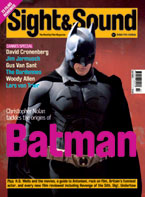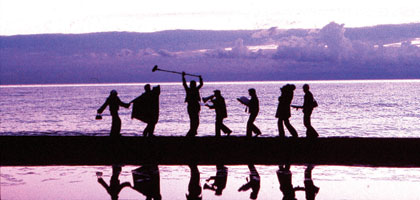
Torremolinos 73
Spain/Denmark 2003

Reviewed by Paul Julian Smith
Synopsis
Our synopses give away the plot in full, including surprise twists.
Madrid, 1973. Alfredo (Javier Cámara) is a struggling encyclopedia salesman, his wife Carmen (Candela Peña) a hairdresser who longs for a baby. Alfredo's boss, Don Carlos (Juan Diego), invites them to a conference at a resort hotel where he informs them that, due to falling sales, the company will now move into porn home-movie production for the Scandinavian market. They are given a brief course in erotic film-making by a visiting Dane.
In spite of their misgivings, the couple take up the challenge and their movies prove popular. They become wealthy, but Carmen is devastated to learn that Alfredo is sterile. She does not tell him, however. Alfredo writes a legitimate script, in the style of his much-loved Ingmar Bergman; Don Carlos agrees to fund it, with Alfredo as director. The project is called 'Torremolinos 73' and filming begins in the beach town, out of season, where Alfredo is confronted with a Danish crew who speak no Spanish. Shooting goes well nonetheless until the last day, when Don Carlos insists on a hardcore finale featuring Carmen and a Danish co-star. Alfredo reluctantly consents. As she has planned, Carmen falls pregnant by the Dane and has the longed-for child which she and Alfredo raise happily together. Alfredo makes no further features, but turns his hand to wedding videos.
Review
Like his main character, an unlikely Spanish everyman caught up in the porn business, Pablo Berger is a first-time director. But you'd never know it, so assured is Torremolinos 73 in its plotting and shooting. Billed as a black comedy, this unique Spanish-Danish co-production has an unerring sense of the 70s period. Interiors are steeped in dingy brown, with fluorescent lights buzzing in the background, while costumes and furniture are distressingly authentic.
Yet there is no caricature here and the production design always supports plot and character. In the opening sequence, bald, paunchy Alfredo treks on foot through a desolate new housing estate, whose bitterly ironic name is 'My Paradise'. And in this brave new world of modernising Spain, the characters are immersed in period media: cartoon children parade on TV (Alfredo's wife Carmen is longing for just such a child) and a radio show coyly raises the question of extramarital sex (just as Carmen is thinking of sleeping with someone else). Even period songs are pointed: pop anthem 'Eres tú' (a Spanish Eurovision entry) points to Alfredo's sterility ('It's you'). When the couple visit the cinema it is to see a huge hit from 1971, Manuel Summers' Adiós, cigüeña, adiós (Bye Bye Stork), a then daring story of teenage pregnancy.
Alfredo's name is chosen for real-life actor Alfredo Landa, who is still identified with the now despised Spanish sex comedies of the 1970s. But Berger brings a comic twist to the familiar genre. Where once chubby Spanish males lusted after the bikinied Swedish girls newly arrived on the coast, now Scandinavians are mesmerised by home-grown Spanish eroticism (Carmen, the star of her husband's porn films, is stalked in a department store by an obsessive Nordic fan). And the couple indulge in a first flush of consumerism that mirrors the Spanish economic miracle of the period. Comically, once more, this is turned into bargain-basement erotica: Carmen proudly removes the laundry from her new washing machine as Alfredo takes her from behind. The 'amateurs' who are still highly prized in porn have rarely seemed as amateurish as here: when Carmen disrobes for the camera for the first time she, poignantly, holds on tight to her handbag. Clearly the couple have earned their place in the 'Danish World Encyclopedia of Reproduction'.
In spite of his premise, writer/director Berger never patronises or belittles his characters. And the serious themes of longing for a child and longing for a film are developed in parallel with the porn plot. Here he is helped by superb performances by the leads, both veterans of Almodóvar. Javier Cámara, who has long honed his klutzy but loveable persona on Spanish TV, broke through as the malignant nurse in Talk to Her; the versatile Candela Peña played the unsympathetic lesbian lover in All about My Mother. Responding well to direction that encouraged them to improvise within a tight script, both give a convincing portrayal of that most elusive and unspectacular of cinematic passions, marital love. Berger cites inspiration from Carlos Berlanga, the director of bitterly sardonic comedies of the Francoist period, which are regularly acclaimed by local critics as the best films ever made in Spain. But where Berlanga's characters are puppets, betrayed by the blackest of humour, Berger's are believably human, however grotesque the circumstances in which they are placed.
An additional irony here is that the art movie is parodied as unerringly as the sex comedy. We are treated to extended clips of Alfredo's black-and-white magnum opus, complete with smart sight gags with a Spanish flavour. Carmen plays Bergmanesque chess with Death, but the camera pulls out to show that they are both riding a pedalo out to sea. Or again, she visits a fairground out of Fellini, but the inevitable dwarves are dressed as bullfighters and flamenco dancers. She struggles vainly with the risible dialogue lovingly crafted for her by her husband ("You have an endless desire for desire"). The effect is rather like a cross between Carry on Camping and Ken Loach.
The final Spanish in-joke is that the couple's long-awaited baby (a product of porno set as fertility clinic) is named Marisol after the child star of the period who chirped her way through a dozen squeaky-clean musical comedies. But UK audiences don't have to recognise these references to enjoy this terrific drama. Torremolinos 73's triumph is to reveal that the sex comedy - that long-lost and much-maligned genre - can be as touching and tender as it is funny. We can only hope that, unlike Alfredo, Pablo Berger is given the chance to make a second feature.
Credits
- Director
- Pablo Berger
- Producer
- Tomás Cimadevilla
- Written by
- Pablo Berger
- Director of Photography
- Kiko de la Rica
- Editor
- Rori Sáinz de Rozas
- Art Director
- Julio Torrecilla
- Music/Music Producer
- Mastretta
